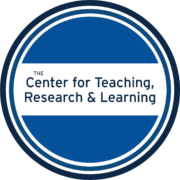CTRL Course Design Institute
CTRL’s Course Design Institute (CDI) is a series of four live sessions and additional materials to support faculty and staff in designing courses and learning environments optimized for equity, engagement, and deep learning. It is meant for anyone aiming to revamp an existing course, create a new course, or enhance their teaching, whether teaching in-person or online. The institute introduces evidence-based practices in course design and teaching, while incorporating ample opportunities for collaboration, reflection, and application. By the end, participants develop a complete course plan and additional instructional materials and ideas to implement directly into teaching.
What is the Course Design Institute and who is it for?
It is a series of live sessions and supplemental materials focused on the foundations of equitable and evidence-based course design and teaching. By the end of the institute, you will have developed a complete course plan plus instructional materials and ideas to implement into your course(s) and teaching.
The Course Design Institute is appropriate for anyone aiming to revamp an existing course, design a completely new course, or enhance their teaching practice, whether teaching in-person, online, or hybrid.
Why should I participate in the Course Design Institute?
Participation in the Course Design Institute offers instructors multiple benefits including:
- A foundation in inclusive and equitable course design to apply to your teaching and course development
- An expanded teaching toolkit, through an introduction to and experience with a variety of inclusive, student-centered, evidence-based teaching practices
- Resources, time, and support to (re)design a course, including access to a resource-packed Canvas page and personalized consultations with CTRL teaching support staff
- Interactions with colleagues from across American University, with structured opportunities for feedback, sharing ideas, and building professional relationships both during the institute and after it concludes
Participants who engage in all the live sessions and complete the required activities will receive a certificate of completion to include in your teaching portfolio or CV as evidence of professional development in teaching.
What should I expect from the Course Design Institute? What is expected of me?
The institute is designed to be a dynamic, interactive, and fulfilling professional development experience that models the student experience. The synchronous sessions include direct instruction and time for participants to discuss course design with colleagues across campus.
Participants should plan to attend all four sessions and dedicate around five additional hours completing short assignments and developing their course materials.
Past Participant Testimonials
Session Topics
Session 1: Apply Equitable Course Design Frameworks
Learning Outcomes:
By the end of the session, participants will be able to:
- Distinguish the concepts of diversity, inclusion, equity, and justice from each other using one model of DIEJ
- Explain how the implementation of Universal Design for Learning strategies can promote student achievement of course learning outcomes
Description:
Where should you begin when (re)designing your course? In this session, we will begin to explore evidence-based frameworks for equitable course design, such as Universal Design for Learning. Throughout the institute, we will prioritize intentionally accessible course design to help you increase engagement and deepen learning for all students. This background will help guide your course (re)design process during the rest of the institute.
Session 2: Develop Purposeful Learning Outcomes
Learning Outcomes:
By the end of the session, participants will be able to:
- Define the backward design process
- Articulate clear, measurable learning outcomes for your course(s)
- Consider alignment of course learning outcomes with assessments and learning experience
Description:
How do you articulate and communicate to students what they will learn in your courses? In this session we will explore the evidence-based backward design process and help you apply it effectively to plan your course(s). You will also learn to develop transparent and measurable learning outcomes that will guide your instructional choices. This session builds on the concepts introduced in Session 1 because you will utilize the frameworks to define inclusive learning outcomes.
Session 3: Assess Learning and Provide Feedback
Learning Outcomes:
By the end of the session, participants will be able to:
- Describe different types of assessments and their benefits
- Develop an assessment plan for your course(s) that aligns with your course learning outcomes
- Apply effective feedback and grading strategies to promote student learning in your courses
Description:
How do you know if students have achieved the course outcomes and how should you assess them? In this session, we will focus on assessment and student learning. Through formative and summative assessments, and various active learning techniques, you will develop a plan to monitor and assess your students’ mastery of learning outcomes. We will also review best practices for providing feedback and evaluating students’ work. This session builds on Sessions 1 & 2 because you will consider which approaches to assessing student learning best align with your learning outcomes.
Session 4: Plan an Equitable and Engaging Learning Experience
Learning Outcomes:
By the end of the session, participants will be able to:
- Identify instructional models that support a student-centered learning experience
- Develop formative assessments to measure and monitor student learning in your course(s)
- Select strategies to make your course(s) more inclusive, equitable, accessible, and/or just
Description:
How will you design the student learning experience to support their achievement of the course learning outcomes? In this session, we will consider evidence-based instructional models and approaches that support student-centered learning. We will also review instructional strategies that can help you build an equitable and positive classroom learning environment. This session builds on the previous 3 sessions to help you determine the appropriate instructional approaches to help students thrive in your course.
Institute Schedule
The Course Design Institute is offered twice per year:
- Fall: Over the course of a month, with sessions once per week
- Spring: Over the course of a week during May Faculty Workshops, with sessions once per day
last updated: 4/17/2025

